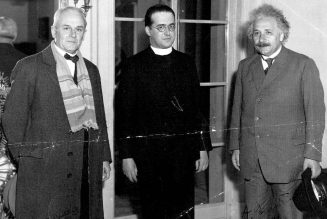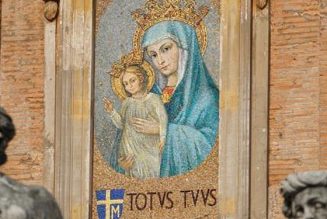By Dr. Jeff Mirus ( bio – articles – email ) | May 22, 2020
Phil Lawler made several excellent points in Rendering to Caesar in an epidemic: the limits of authority. We agree that it is not quite fair to make adverse judgments against the bishops simply for complying with civil restrictions designed to control the pandemic. But as Phil pointed out, there is certainly good reason to be concerned about the general deference of our bishops to the dominant culture, as frequently represented by civil authority.
Perhaps I can best put it this way: The problem is not that the bishops have generally accepted without criticism or resistance the universal pandemic restrictions mandated by the civil authority (though I note that the bishops of Minnesota have decided to defy the continuing restrictions on public Masses there). The problem is that, as a general rule in the West, our bishops too often appear to be more concerned with maintaining their image as respectable “players” in the larger socio-political order, where they have approximately zero influence and certainly zero control, than they are with putting God’s house in order, where they still (even after decades of general incompetence and neglect) have nearly complete control. (In fairness, I must grant that universities and religious orders, where the rot is often far advanced, are very frequently beyond effective episcopal control. Here open breaches may be only the beginning of a long and strenuous path.)
In addition to Phil’s own ongoing analysis, I have written so many times about this problem, even so far this year, that I wonder whether I need to do it again. Consider every piece I’ve written which cites St. Paul’s famous question, “What have I to do with judging outsiders?”—including The first requirement of Church renewal in our time (March 28, 2017), Catholicism is even more local than politics (January 14, 2020), Our real pandemic is the loss of Christian identity, and The German Synodal Path: Noteworthy or not worthy?. Still, I depend not only on my own short memory, but on the forbearance of my readers (not all of whom can yet quote me on short notice), and on the blithely-presumed interest of those who are new to the topic.
Habits of dominance
In the course of Western history (and Western history only, apparently), the Catholic Church became for a period of time highly influential spiritually, culturally, socially and politically. But that is not at all the normal state of affairs for the Church Christ founded, as is amply illustrated by nearly all of Our Lord’s cautions, beginning with “Blessed are you when men hate you, and when they exclude you and revile you, and cast out your name as evil, on account of the Son of man!” (Lk 6:22). Typically this “blessedness” comes about only when Christians bear witness against the dominant culture (worldly power). If this “blessedness” is consistently lacking, either a particular culture is for the moment enjoying a remarkable commitment to Christianity (as does happen on rare occasions) or something is seriously broken in the prophetic witness of the Church.
The problem in the West is that the time of respect for the Church is long past, but churchmen in the West have never quite gotten used to it. The default position is to stave off ecclesiastical suffering at the hands of an ungrateful culture by three more or less reflexive stratagems:
- Emphasize and speak out strongly on prudential issues on which the dominant culture advocates a policy which is at least superficially compatible with Catholic principles (common episcopal positions on immigration and the environment are two excellent contemporary examples—which, of course, renders them not wrong but convenient);
- Substitute personal affirmation for moral teaching when dealing with absolute moral issues on which the dominant culture is dead set against Christ and the Church; and
- Maintain good relations with the secular authorities so as not to sacrifice the “good standing” and the illusion of traction which Western bishops grew up thinking they would have.
If the prevailing patterns were not so spiritually tragic, they would be comedic, for they are at least farcical. Nobody in the dominant culture of the West today has the slightest use for bishops except for the purpose of continuing to shape and restrict the Church more easily according to the purposes of the reigning secular elites. The Church manifestly cannot get stronger unless or until bishops wean themselves from the illusion that they are players in the shaping of the larger culture. I call this an illusion because it is created by the acceptance bishops gain if they behave in ways that make them useful to this same larger culture.
An essential shift
To some degree it is understandable that many bishops have not adjusted to the stark reality of life in the contemporary West, for it remains barely possible for the Church and her members to remain comfortable simply by choosing their battles to correspond with the ever-thinning overlap between secular and Catholic morality. That is exactly what most Western bishops do, from the episcopal conference on down, in order to maintain the player illusion. But Jesus Christ was not a player. He did not grasp at any sort of “equality”, but became “obedient unto death” (Phil 2:6-8).
The most important challenge faced by Catholic bishops today is to accept their Christic role as suffering servants of the mysteries of God. By restoring obedience to these mysteries in every local church—I mean the mysteries of faith and morals and sacraments—they could (a) end the crisis of vocations in the West; (b) right-size and strengthen the Church; (c) present a clear witness to the world by removing the secular bushel basket from over the lamp of Christ; and (d) fulfill to the letter the following prophecy of Jesus Christ:
Truly, I say to you, there is no one who has left house or brothers or sisters or mother or father or children or lands, for my sake and for the gospel, who will not receive a hundredfold now in this time, houses and brothers and sisters and mothers and children and lands, with persecutions, and in the age to come eternal life. But many that are first will be last, and the last first. [Mk 10:29-31; emphasis added]
I ask again with St. Paul, “For what have I to do with judging outsiders? Is it not those inside the church whom you are to judge? God judges those outside” (1 Cor 5:12-13). If Paul says this to all the members of the church in Corinth, how much more does it apply to those set over the churches of our time? Our bishops must curtail the eagerness of their episcopal conferences to participate in national and regional debates. God judges those outside. They must, each in his own diocese, devote themselves to faith, morals and sacraments, insisting that each of their priests be a close collaborator in this work. They must provide for charitable works not through government grants but through deacons and others set aside for this purpose, attending first and foremost to the needs of the Church’s own members.
Let the light draw those who are in darkness; let living water draw those who thirst. What other priorities did Our Lord have in mind for any of us when He said: “Seek first his kingdom and his righteousness…. Therefore do not be anxious about tomorrow, for tomorrow will be anxious for itself. Let the day’s own trouble be sufficient for the day” (Mt 8:33-34).
Transcendent power
One grows weary of arguing the case for a Church whose leaders are so frequently dominated by considerations of human respect. There are, of course, many bishops, priests, deacons, religious and laity who are not. But the Church is very frequently rendered impotent by those who are, even if it is quite likely that the Church has been dominated by this group in most periods of her troubled existence. In some measure, at least, I acknowledge that this must be characteristic of a Church of sinners. Moreover, each of us can remain full of both gratitude and hope only because Christ’s Church is always exactly that.
But what is the crisis of the Church in the West today if not a crisis of those who refuse to embrace a genuine commitment to a Church that is no longer culturally dominant? So I ask again: What have we to do with judging outsiders? Is it not those inside the church whom we are to judge? And do not our own bishops most often stand in the way of precisely that sort of judgment? And is not the Church horribly disfigured, weakened and robbed of her evangelical witness as a result?
Now, surely we have this treasure in earthen vessels only “to show that the transcendent power belongs to God and not to us.” Again, St. Paul: “We are afflicted in every way, but not crushed; perplexed, but not driven to despair; persecuted, but not forsaken; struck down, but not destroyed; always carrying in the body the death of Jesus, so that the life of Jesus may also be manifested in our bodies” (2 Cor 4:7-12).
My point is that until we see the full truth about earthen vessels represented far more frequently than we do—in both our bishops and ourselves—there will be all too little transcendent power to be seen.
Sound Off! CatholicCulture.org supporters weigh in.
All comments are moderated. To lighten our editing burden, only current donors are allowed to Sound Off. If you are a donor, log in to see the comment form; otherwise please support our work, and Sound Off!

There are no comments yet for this item.









